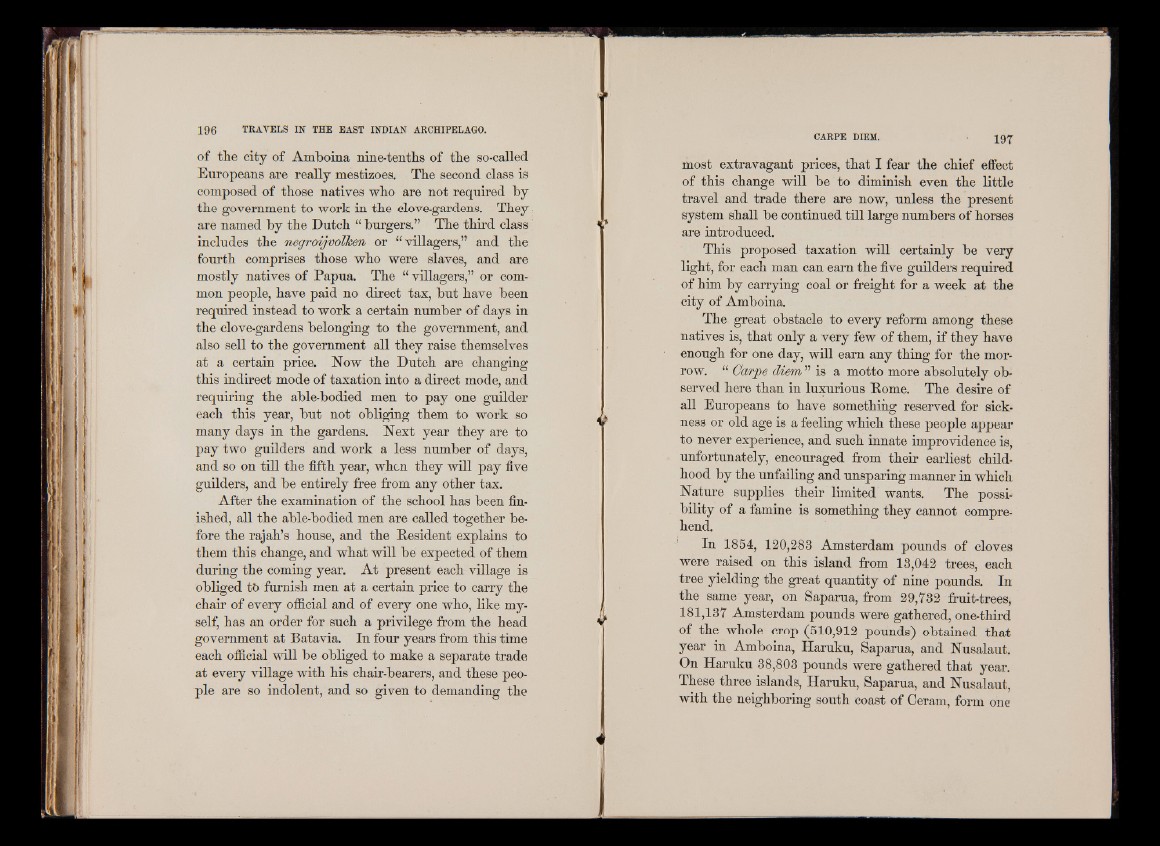
of the city of Amboina nine-tenths of the so-called
Europeans are really mestizoes. The second class is
composed of those natives who are not required by
the government to work in the clove-gardens. They
are named by the Dutch 1 burgers.” The third class
includes the negroijvolJeen or “ villagers,” and the
fourth comprises those who were slaves, and are
mostly natives of Papua. The “ villagers,” or common
people, have paid no direct tax, but have been
required instead to work a certain number of days in
the clove-gardens belonging to the government, and
also sell to the government all they raise themselves
at a certain price. Now the Dutch are changing
this indirect mode of taxation into a direct mode, and
requiring the able-bodied men to pay one guilder
each this year, but not obliging them to work so
many days in the gardens. Next year they are to
pay two guilders and work a less number of days,
and so on till the fifth year, when they will pay five
guilders, and be entirely free from any other tax.
After the examination of the school has been finished,
all the able-bodied men are called together before
the rajah’s house, and the Resident explains to
them this change, and what will be expected of them
during the coming year. At present each village is
obliged tt) furnish men at a certain price to carry the
chair of every official and of every one who, like myself,
has an order for such a privilege from the head
government at Batavia. In four years from this time
each official will be obliged to make a separate trade
at every village with his chair-bearers, and these people
are so indolent, and so given to demanding the
most extravagant prices, that I fear the chief effect
of this change will be to diminish even the little
travel and trade there are now, unless the present
system shall be continued till large numbers of horses
are introduced.
This proposed taxation will certainly be very
light, for each man can earn the five guilders required
of him by carrying coal or freight for a week at the
city of Amboina.
The great obstacle to every reform among these
natives is, that only a very few of them, if they have
enough for one day, will earn any thing for the morrow.
“ Carpe diem ” is a motto more absolutely observed
here than in luxurious Rome. The desire of
all Europeans to have something reserved for sickness
or old age is a feeling which these people appear
to never experience, and such innate improvidence is,
unfortunately, encouraged from their earliest childhood
by the unfailing and unsparing manner in which
Nature supplies their limited wants. The possibility
of a famine is something they cannot comprehend.
In 1854, 120,283 Amsterdam pounds of cloves
were raised on this island from 13,042 trees, each
tree yielding the great quantity of nine pounds. In
the same year, on Saparua, from 29,732 fruit-trees,
181,137 Amsterdam pounds were gathered, one-third
of the whole crop (510,912 pounds) obtained that
year in Amboina, Haruku, Saparua, and Nusalaut.
On Haruku 38,803 pounds were gathered that year.
These three islands, Haruku, Saparua, and Nusalaut,
with the neighboring south coast of Ceram, form one